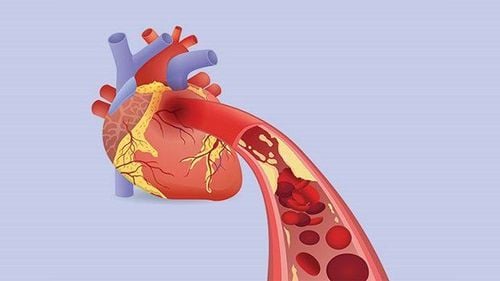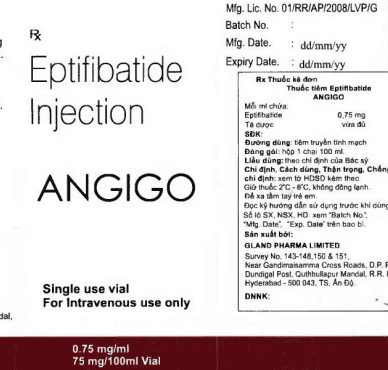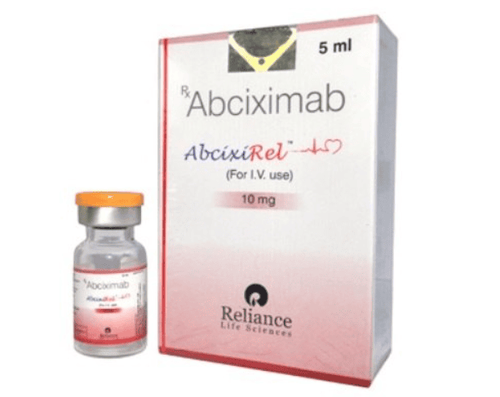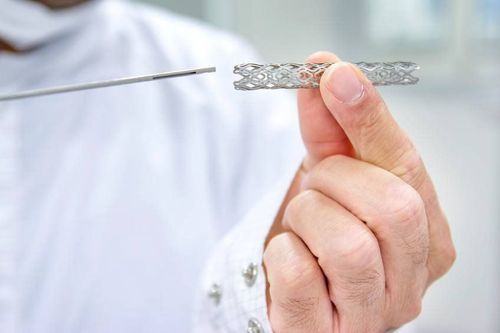This is an automatically translated article.
Percutaneous coronary intervention is a method of using a small catheter inserted through the femoral artery or radial artery into the coronary artery, then intervened with angioplasty, placing a bracket in cases of coronary stenosis. For this method, there are usually only relative contraindications, in some cases, even though coronary intervention is contraindicated, intervention is still required.
1. Which case is contraindicated for coronary intervention?
Contraindications in percutaneous coronary intervention include:
At the treatment site, there is no cardiac surgery unit and support facilities when necessary; Injury to coronary arteries that is not suitable for vascular intervention: In case the patient has severe diffuse injury without focal damage, multiple coronary artery lesions, damage to the distal part of the coronary artery... Vascular injury a coronary artery that is assessed to be at high risk of death if that coronary artery is re-occluded during percutaneous coronary intervention; Disorders of clotting factors, low platelet count, taking anticoagulants... increases bleeding; The patient did not comply with the treatment regimen before and after the intervention procedure; A single vessel that supplies all of the blood to the heart is narrowed. Common trunk stenosis without accompanying collateral circulation; Re-stenosis in many locations after intervention... Mild coronary artery stenosis less than 50%; Patients with severe renal failure, decompensated heart failure; History of allergy to contrast media ; Ongoing infection, particularly infection at the site where entry will be established; Patients with biochemical and electrolyte disorders, anemia... Severe peripheral vascular diseases: Difficulty in arterial access, serious complications such as occlusion or separation may occur. arterial wall, bleeding difficult to stop... Signs of abdominal aortic aneurysm ; Severe high blood pressure that cannot be controlled with medication.
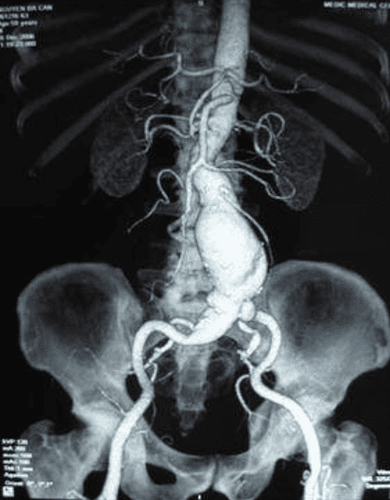
Người bệnh có dấu hiệu của phình động mạch chủ bụng không nên can thiệp mạch vành
2. How to handle cases that need to be treated for coronary artery disease with contraindications to coronary intervention?
Although many cases are thought to have a relative contraindication to percutaneous coronary intervention, surgery is sometimes required because it may be the only option.
Some solutions for patients with relatively contraindications can be applied such as:
For cases where there is no supportive cardiovascular surgery: Usually this case is considered an absolute contraindication, However, in cases of acute myocardial infarction that require urgent coronary intervention to save the patient's life, intervention can be performed if the doctor is experienced and performed in the center. licensed centers, even if there is no ready-made supportive heart surgery. In case patients are taking the anticoagulant warfarin or have coagulation-related diseases, it is necessary to reassess coagulation factors and discontinue anticoagulation 3 days before surgery. Common coronary stenosis without collateral circulation: Often replaced by bypass surgery, however, many experts now believe that percutaneous coronary intervention can still be performed. History of allergy to contrast media: It is necessary to take full account of the patient's allergy history. Abdominal aortic aneurysm: Select the intervention route through the radial artery. In case of severe renal failure: Assess renal function and limit the use of contrast agents during percutaneous coronary intervention. Assess electrolyte disturbances requiring treatment before intervention. In case of anemia, if emergency intervention is required, a suitable blood source must be prepared for the patient in case of blood loss. In the case of coronary artery stenosis less than 50%, most of the time, only medical treatment is applied. Only when optimal medical therapy does not bring results, consider using percutaneous coronary intervention. In the case of an active infection: A stable infection should be treated before intervention is warranted. In particular, the case of infection at the site of vascular entry, if the intervention will increase the risk of sepsis complications, serious bleeding affecting life. Contraindications to percutaneous coronary intervention are usually relative contraindications. Every case requires a detailed assessment and consideration of the pros and cons of this technique. In addition, the most important thing is that the patient must agree to the risks that may occur during and after the intervention.
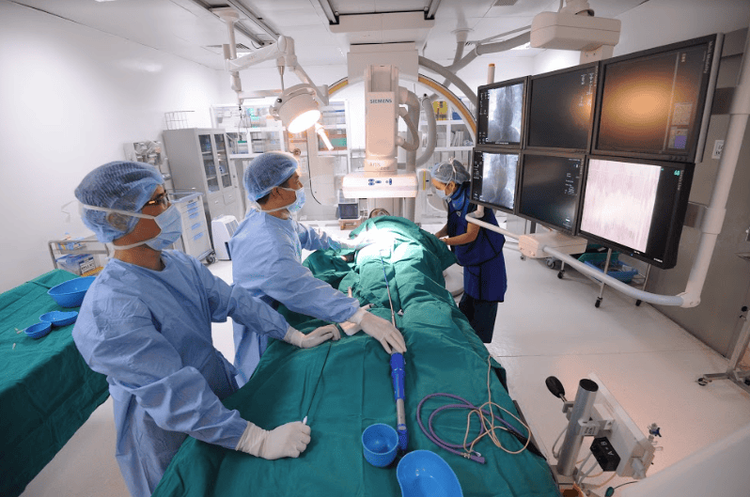
Hình ảnh người bệnh được điều trị bằng can thiệp tim mạch với máy móc hiện đại tại Bệnh viện Vinmec
In summary, percutaneous coronary intervention is a difficult technique, requiring medical facilities to have a team of highly qualified and experienced doctors and nurses in the field of Cardiology and medical facilities. quality, modern equipment. Vinmec International General Hospital is one of the most prestigious medical treatment units for cardiovascular diseases in Vietnam. Vinmec's Cardiology Department has always received much praise and satisfaction from domestic and international customers, being the pioneers in successfully applying the world's most advanced techniques in the treatment of cardiovascular diseases.
A team of highly qualified and experienced specialists: qualified doctors from Master's to Professor's and Doctor's degrees, reputable in medical treatment, surgery, interventional cardiac catheterization. Intensive training at home & abroad. In particular, Prof. TS.BS Vo Thanh Nhan - Cardiology Director of Vinmec Central Park was recognized as the first and only expert in Vietnam to be awarded the "Proctor" certificate on TAVI. State-of-the-art equipment, comparable to major hospitals in the world: The most modern operating room in the world; The most modern silent magnetic resonance imaging machine in Southeast Asia; The CT machine has a super-fast scanning speed of only 0.275s/round without the use of drugs to lower the heart rate; 16-sequence PET/CT and SPECT/CT systems help to detect early damage to cardiovascular organs even when there are no symptoms of the disease. Applying the most advanced advanced cardiovascular techniques in the world in treatment: Painless open heart surgery; Percutaneous aortic intervention without general anesthesia; Treatment of mitral regurgitation through the catheter has a success rate of 95%; Ventricular-assisted artificial heart transplantation for patients with end-stage heart failure prolongs quality of life beyond 7 years. Cooperating with leading cardiovascular centers in Vietnam and the world such as: National Heart Institute, Cardiology Department of Hanoi Medical University, University of Paris Descartes - Georges Pompidou Hospital (France), University of Pennsylvania (France), University of Pennsylvania United States)... with the aim of updating the most modern cardiovascular treatments in the world. To be examined and treated with leading Vinmec cardiologists, please book an appointment online at the website or contact Vinmec Health System nationwide for service.
Please dial HOTLINE for more information or register for an appointment HERE. Download MyVinmec app to make appointments faster and to manage your bookings easily.




